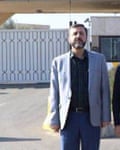Iran is holdings talks in Geneva with Britain, France, Germany and the EU in an try and discover a means out of an deadlock over its nuclear programme, in what would be the final likelihood of a breakthrough earlier than Donald Trump takes up the US presidency once more.
Trump, who pursued a coverage of “maximum economic pressure” towards Iran throughout his first time period, returns to the White Home on 20 January.
On the eve of the talks, Kazem Gharibabadi, an Iranian minister, ratcheted up tensions by saying the EU “should abandon its self-centred and irresponsible behaviour” on a variety of points together with the battle in Ukraine and the Iranian nuclear situation.
Europeans have grow to be more and more annoyed with Iran’s strategy, together with its provision of arms for Russia’s battle in Ukraine and its lack of cooperation with the UN nuclear inspectorate, the Worldwide Atomic Power Company (IAEA). Some Europeans concern that Iran’s rising stockpile of extremely enriched uranium reveals it’s on a covert path to constructing a nuclear bomb.
Iran believes Europe rebuffed a transparent sign of willingness to barter when Tehran supplied to cap its uranium enrichment programme at 60% and to permit skilled IAEA nuclear inspectors again into Iran.
Talking in Paris on Friday alongside his British counterpart, Richard Moore, the French overseas intelligence chief, Nicolas Lerner, stated the chance of an Iranian nuclear proliferation was anticipated to be probably the most “critical threat” in coming months. Moore stated the Iranian regime’s nuclear ambitions “continue to threaten all of us” regardless of the sequence of blows dealt in current months to Tehran’s allied militias throughout the Center East.
The goal of the Geneva assembly is to see if there’s a foundation for the Iranian supply to be developed, in addition to to hunt limits to Iranian-Russian army cooperation. In return, the EU may attempt to elevate some financial sanctions, however the timetable is brief earlier than Trump takes energy.
Iran insists it has not offered any ballistic missiles to Russia, an assurance that the US doesn’t settle for.
In a pre-meeting between Gharibabadi and the EU’s chief negotiator, Enrique Mora, little widespread floor was discovered, judging by the accounts of the exchanges issued by each side.
Gharibabadi, Iran’s deputy overseas minister for authorized and worldwide affairs, wrote on X: “Europe should not project its own problems and mistakes onto others, including with regard to the conflict in Ukraine. With their complicit behaviour towards the ongoing genocide in Gaza, Europe – specifically the three major countries – lack any moral ground to preach others on human rights.
“With regard to the nuclear issue of Iran, Europe has failed to be a serious player due to lack of self-confidence and responsibility.”
Mora issued a shorter assertion on social media, saying the 2 sides had frank exchanges. He added: “Iran’s military support to Russia that has to stop, the nuclear issue that needs a diplomatic solution, regional tensions (important to avoid further escalation from all sides) and human rights.”
after e-newsletter promotion
The mistrust between the 2 sides was made evident when the E3 nations on 21 November pushed forward with a movement ordering the nuclear inspectorate to organize a “comprehensive” report on Iran’s nuclear actions – the stepping stone mandatory for European nations subsequent autumn to snap again the UN sanctions that have been imposed on Iran earlier than it signed the 2015 nuclear deal.
The UN nuclear company has confirmed that Iran plans to put in about 6,000 new centrifuges to counterpoint uranium, based on a report seen by AFP on Friday. “Iran informed the agency that it intended to feed” about 6,000 centrifuges at its websites in Fordo and Natanz to counterpoint uranium to as much as 5%, increased than the three.67% restrict Tehran had agreed to in 2015.
Seyed Abbas Araghchi, Iran’s overseas minister, stated this week that the goal of the assembly was to search out out whether or not the EU wished cooperation or confrontation. He stated that any snapback of UN sanctions was prone to result in a change within the debate inside Iran about its possession of nuclear weapons.
Iran has a fatwa in place opposing its possession of nuclear weapons, and the nation insists its nuclear programme is just for civil functions.
Araghchi feels annoyed that Europe didn’t take a clearer unbiased strategy after Trump pulled the US out of the nuclear deal in 2018, undercutting reformists inside Iran who stated cooperation with the west over its nuclear programme would result in a lifting of financial sanctions.
Araghchi says Europe has performed little to hunt compromise because the election in the summertime of the reformist president, Masoud Pezeshkian, who’s dedicated to lifting sanctions by providing a extra balanced coverage between east and west.




